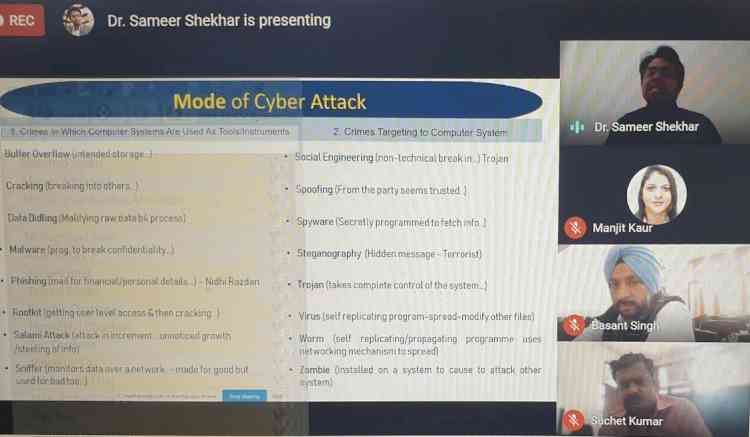LPU organised webinar on cyber crime and its socio-economic consequences
Renowned academician and columnist from Logistics Division, Ministry of Commerce & Industry (Government of India) Dr Sameer Shekhar was the resource person

Jalandhar: The Department of Government and Public Administration at LPU organised an important webinar on ‘Cyber Crime in India and its Socio-economic Consequences’. Renowned academician and columnist from Logistics Division, Ministry of Commerce & Industry (Government of India) Dr Sameer Shekhar was the resource person. Also, Post-Doctoral Fellow at Indian Institute of Foreign Trade (IIFT), Dr Shekhar explored relevance and relationship of the cyber security and threats thereupon. While talking about different modes of cyber-attacks/crimes and its socio-economic consequences; Dr Shekhar also forwarded advice to the webinar participants to be more vigilant, especially during the current pandemic phase.
Providing an overview of cybercrime scenarios in the country, expert Dr Shekhar also elaborated various dimensions of cyber-attack by citing examples of other countries including USA, Germany, China, Russia, Mexico and others. He discussed the major impact of cyber-attacks, and also suggested effective measures to avoid these with special reference to e-mail safety and virus warnings. For him, cybercrime is an evolution of traditional crime, and has a direct impact on economic growth, innovation and investment.
It was also shared that the types of biggest economic impact through cybercrime include: the loss of IP (Intellectual Property) and business-confidential information; online fraud and financial crimes; disruption in production/ services; reducing trust in online activities; cost of securing networks; buying cyber insurance; and, paying heavily for recovery from cyber-attacks. Some favouring recommendations on how to deal with cybercrime include: uniform implementation of basic security measures; investment in defensive technologies; cooperation among international law enforcement agencies; improved collection of data by national authorities; standardisation and coordination of cyber security requirements; and, International pressure on refuges for cybercrime.
In fact, the economic impact of cybercrime is significant and rising. Cyber-attacks are becoming easier to carry out while defences remain inadequate. Businesses need to take the economic impact of cybercrime more seriously, with the cost of cybercrime is now up to a big part of the global gross domestic product (GDP). This happens due to easy availability of cybercrime tools; rapid adoption of new technologies by cyber criminals; expanding number of cybercrime centres; and, also the growing cleverness of top-tier cyber criminals. /(March 22, 2021)


 cityairnews
cityairnews 










